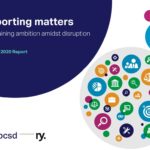In the face of unprecedented global, regional and local sustainability challenges, the need for transparent and effective non-financial reporting has never been more urgent. In partnership with Radley Yeldar, the WBCSD has conducted one of the largest independent research projects of corporate non-financial reporting, entitled Reporting Matters WBCSD 2013 Baseline Report .
Reporting Matters, launched at the WBCSDs Council meeting this week in Istanbul,sheds light on effective non-financial reporting practices and offers a pool of inspirational examples to stimulate the sharing of best practices. The review provides recommendations so that corporate reports can help companies create value for all stakeholders in the short, medium and long-term.
Using a set of qualitative criteria, the WBCSD conducted a review of 175 of its members sustainability reports to identify effective reporting practices for the benefit of WBCSD members and the wider corporate community. The research reveals that while there are many examples of outstanding reporting practice, there are also many opportunities to make reporting even more effective often through simple quick-win actions.
Reporting practices need to change to ensure that businesses are truly valued on what is important and that more sustainable companies get better recognized and rewarded for their performance, said Peter Bakker, President of the WBCSD.
Reporting Matters also takes into account recent developments in reporting frameworks such as the Global Reporting Initiative (GRI) G4 Guidelines and the recently issued draft of the Integrated Reporting Framework. Although integrated reporting is by no means the principle channel through which companies report on their non-financial performance, Reporting Matters research shows that the GRI guidelines are used by the majority of companies, and that the Integrated Reporting Framework is gaining traction.
The report also suggests that effective corporate reports are those that are engaging and meet readers information needs, which is why a significant part of the research in Reporting Matters focuses on report users experience.
Understanding report audiences needs is key to effective reporting. The very best reports can act as a catalyst for change, and thats why this research is so important in providing much needed focus on how to report in addition to what, said Ben Richards, Head of Sustainability at Radley Yeldar.
Among many criteria, the concept of materiality emerges as the cornerstone of effective reporting. Derived from a principle of financial reporting, materiality is used to help focus on a more strategic approach as well as to guide investment and resources allocation decisions.
Through effective reporting, the WBCSD urges companies to scale up solutions toglobal priorities identified by the WBCSDs new Action2020 initiative, and progress towards its Vision2050ideals of true cost, true profit and true value. The WBCSD will work with its members on changing the rules of the game by developing tools for the integration of sustainability into risk management frameworks and valuation models, and through engagement with standard setters, the investment community and regulators.



